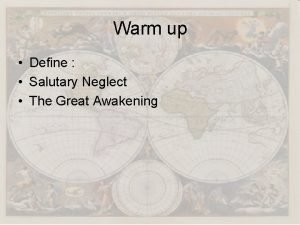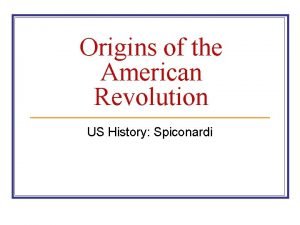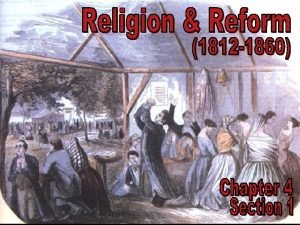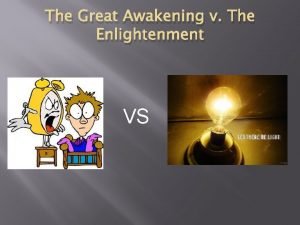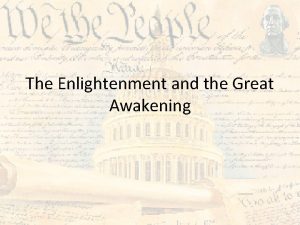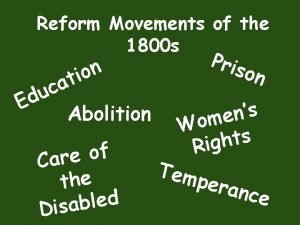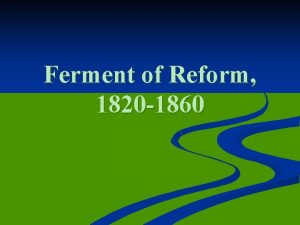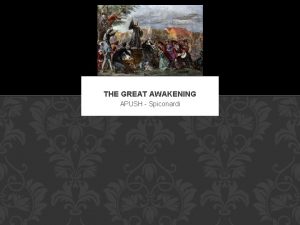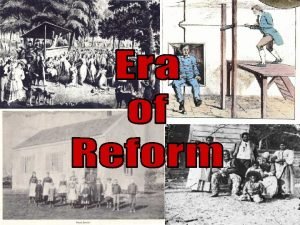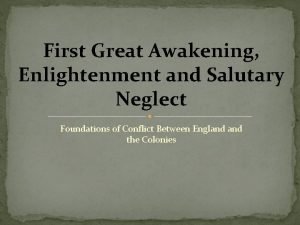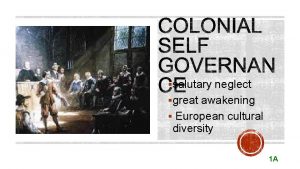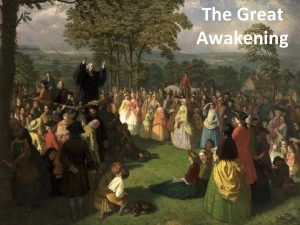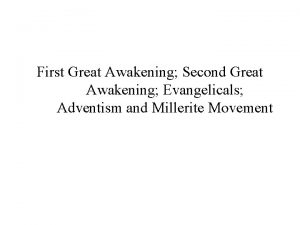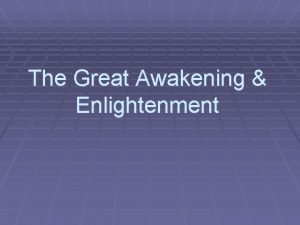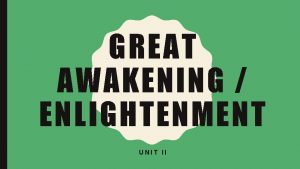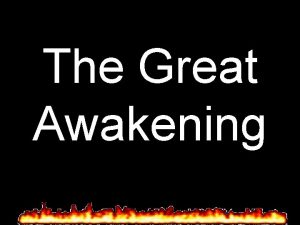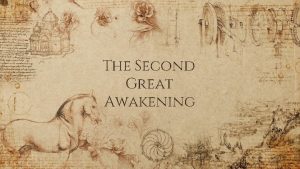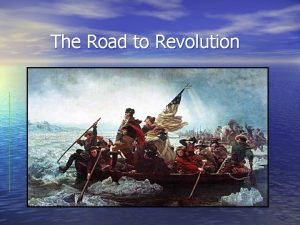Warm up Define Salutary Neglect The Great Awakening














- Slides: 14

Warm up • Define : • Salutary Neglect • The Great Awakening

European Settlement of North America th (17 Century)

Standard • c. Describe different methods of colonial self-governance in the period of Salutary Neglect.

Change of Guard in England • • • The Catholic monarch, James II, took the English throne in 1685 and tried to singlehandedly rule without Parliament. England’s Protestant majority was fearful of the new king’s unrestricted power. James II also put the North American colonies more tightly under his control by revoking charters and combining the New England colonies with New York and New Jersey to form the Dominion of New England, which was to be governed not by colonial assemblies, but by a governor and council appointed by the King. In 1689, the Glorious Revolution marked the overthrow of James II. He was replaced by the Protestant monarchs, King William and Queen Mary, who signed the English Bill of Rights as a condition of their ascent to power. The Dominion of New England was dissolved by the colonies and they returned to their previous colonial arrangement as news of the Glorious Revolution reached North America. One outcome of the reestablishment of the colonies was the combination of Massachusetts Bay and Plymouth into one Massachusetts colony.

Salutary Neglect • • • The colonies reestablished their local governments with the transition of English political power at the time of the Glorious Revolution. In 1721, Robert Walpole became the first Prime Minister in England. His approach to the colonies became known as Salutary Neglect. Walpole believed that the colonies would become more economically productive if they were not restricted by cumbersome policies that limited their ability to trade, such as the Navigation Acts. From the 1720 s until after the French and Indian War in the 1760 s, the colonies were less restricted in their ability to build up their own trade networks and govern themselves locally because of the policy of Salutary Neglect. As long as England was receiving the colonial resources they needed to maintain production under the mercantilist arrangement, there would be less oversight of the colonies by the English Crown.

House of Burgesses • • The colonies had always been somewhat independent of English control due to distance limitations, structure of the colonial governments, and the greater proportion of eligible voters in the colonies. The methods of colonial self-government that existed during the period of Salutary Neglect firmly established the tradition of independence that would later lead to revolution between England her colonies. The political structure of each colony by the time of the Revolutionary War consisted of a governor and an elected legislature. The earliest of the elected legislatures, the House of Burgesses, had been established shortly after Jamestown’s founding. Colonial legislatures, such as Virginia’s, had long traditions of making local policies and were made up of locally elected colonists. Taxes were levied by these colonial representatives and established the tradition of local taxation by locally elected representatives. Many New England colonies had town meetings that met regularly for people to vote directly on public issues.

House of Burgesses • • Voting in the colonies was often restricted to only white males who owned at least some land. Even so, this criteria encompassed a much higher proportion of citizens than other countries - including England. Religious restrictions had even been removed from the New England colonies’ voter eligibility by the time of the American Revolution, which further expanded the tradition of local colonial participation in governing.

Nathan’s Rebellion • • • There was also an expectation that emerged in the colonies that the local legislatures would be responsible for looking out for the interests of all colonists and not just the wealthy. This concept played out dramatically with the events surrounding Bacon’s Rebellion in Jamestown in the late 1670 s. Former indentured servants had worked off their debt but could not afford land in the township itself. Instead, they had to move farther into the frontier and often faced conflicts over land with the area’s American Indians. These poor citizens payed taxes and expected the House of Burgesses to provide protections for them, even though they lived further out from the wealthy Jamestown community. Nathanael Bacon led these poor citizens first against the American Indians and then against the Jamestown elite, including the Royal Governor William Berkeley. Bacon’ Rebellion, between the poor frontier colonists and Virginia’s colonial government, established an expectation in America that the government would work for the good of all citizens – not just the wealthy.

• • The tradition of English colonial self-government began early with the pledge of majority rule under the Mayflower Compact and the establishment of colonial legislatures. During the period of Salutary Neglect, the role of these local assemblies and town meetings expanded. It was during this time that the English government, following the Glorious Revolution, scaled back their political oversight of the colonies as long as the economic resources were being provided to England. Political autonomy and self-government in the colonies grew to be an expectation and formed an independent American identity that ultimately led to war between England her colonies.

Standard • d. Explain the role of the Great Awakening in creating unity in the colonies and challenging traditional authority

The Great Awakening • • • The Great Awakening was a religious movement influenced by the revivals that were sweeping through England, Scotland, and Germany in the 1730 s. It spread from Europe to the colonies in the following decade and continued until the eve of the American Revolution. The revival placed an emphasis on individual religious experience rather than religious experience through church doctrine. The Great Awakening challenged established authorities as the colonists questioned the need to follow not only the Church of England but also the orders of the English monarchy and its authorities. The idea of the shared struggle that Awakening ministers had spoken of was easily transferred to the shared struggle for independence that was beginning to unify the colonies.

The Great Awakening • • • The Great Awakening was in part a reaction to the Enlightenment, which emphasized logic and reason and stressed the power of the individual to understand the universe based on scientific laws. Similarly, individuals grew to rely more on a personal approach to salvation than church dogma and doctrine through a personal understanding of scriptures. Although the Enlightenment was really a movement of the intellectual elite, the Great Awakening had stronger appeal across all cross sections of society in each of the thirteen colonies.

Jonathan Edwards and George Whitefield • • Ministers such as Jonathan Edwards, William Tennent, and George Whitefield began to urge Christians to adopt a more emotional involvement in Christianity through fervent prayer and personal study of the Bible. Their sermons were emotional, appealing to the heart not just the head. New denominations such as Baptists, Methodists, and Presbyterians gained members and challenged some of the old established colonial denominations such as the Congregationalist Puritans in New England the Anglicans in the South. Practicing religion became an emotional experience in addition to an intellectual experience. One of the most famous sermons that typifies the religious fervor and emotional nature of the Great Awakening was Jonathan Edwards’ “Sinners in the Hands of an Angry God. ” The sermon urged the congregation to repent and not provoke God who is all knowing.

• • • The American colonies, especially those in New England, had been founded on the idea that government ruled on the basis of a covenant relationship with God and the people (e. g. , The Mayflower Compact). The governance structure of the new churches reflected this idea as churches appointed their own ministers and administered their own churches. This sense of independence was soon reinforced by the political ideas of John Locke’s social contract and Thomas Paine’s emotional appeal for independence.
 Define salutary neglect
Define salutary neglect Define salutary neglect
Define salutary neglect During the period of salutary neglect
During the period of salutary neglect End of salutary neglect date
End of salutary neglect date Salutary neglect apush
Salutary neglect apush Salutary neglect
Salutary neglect Define second great awakening
Define second great awakening Great awakening vs the enlightenment
Great awakening vs the enlightenment Great awakening vs enlightenment
Great awakening vs enlightenment Second great awakening
Second great awakening American reform movements between 1820 and 1860
American reform movements between 1820 and 1860 Second great awakening apush chapter 15
Second great awakening apush chapter 15 2nd great awakening apush
2nd great awakening apush Awakening objectives poe
Awakening objectives poe Enlightenment vs great awakening
Enlightenment vs great awakening
